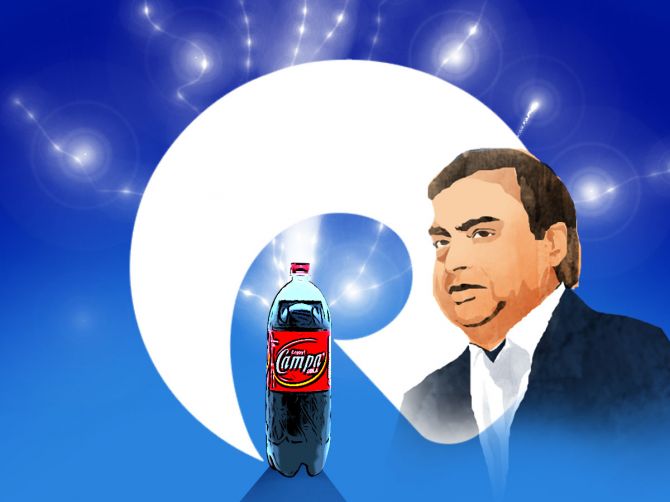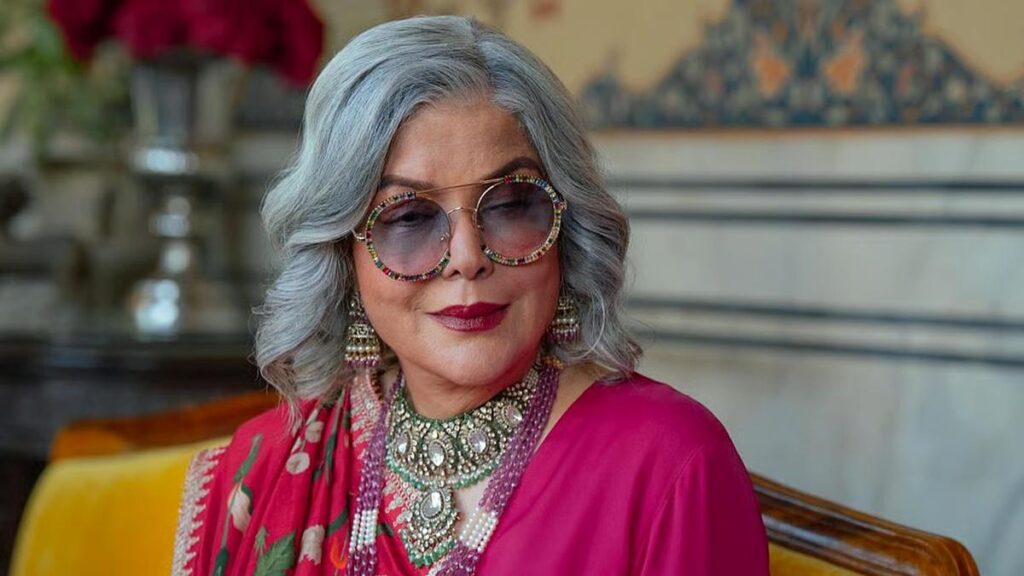Most actors usually face obscurity after a fade-out from the limelight.

IMAGE: Zeenat Aman in The Royals.
Zeenat Amanullah Khan. Zeenat Aman. Yes, Zeenie baby — the hottest heroine of the ’70s and ’80s.
Zeenat of Dum Maro Dum fame. Zeenat of Qurbani fame. Zeenat of Insaaf Ka Tarazu fame. Of Satyam Shivam Sundaram fame.
Zeenat Aman, the Femina Miss India runner-up who became the sexiest and zingiest star of a generation gone by, took a longish break from films in the mid-’80s.
She did return to the silver screen in cameo, insignificant roles over the next many years, but they were sporadic and listless.
Therefore, there was much buzz in recent months about Zeenat Aman’s much-anticipated comeback in Netflix’s The Royals, where she played the role of Maji Sahiba — the regal matriarch of a royal family entangled in palace politics and contemporary scandals. But her return has left fans disheartened.
The return of 1970s screen siren Zeenat Aman has turned high expectations to dust: A classic case of more smoke than screen. Her role is not just underwhelming, it is a great opportunity hopelessly, and mercilessly, squandered — and wasted.
Zeenat Aman has been reduced in The Royals to a glorified cameo — mostly seen smoking weed, delivering cryptic (and uninteresting) one-liners, sitting around stoically — her presence in the narrative largely neglected.

IMAGE: Bobby Deol in Animal.
Most actors usually face obscurity after a fade-out from the limelight.
In recent times, Bobby Deol has been one significant exception.
After an inordinately prolonged lull in his career as a hero, he embraced the challenge of portraying a villain with a unique look, intense characterisation, and powerful performances, redefining his own image as an actor.
Bobby Deol’s realistic acceptance of the comatose state of his career, coupled with a determination to perhaps prove himself, has paved the way for a most spectacular comeback.
He has broken away from the shackles of his past image of a romantic hero and delivered stellar performances that have resonated with newer audiences who had perhaps never seen him in his earlier avatar.
In both Animal and Aashram, his negative roles play a pivotal role in driving the storyline, impacting the narrative through his portrayals.
Deol’s comeback has been actually more powerful than his first innings as a goody-goody hero.

Illustration: Dominic Xavier/Rediff
Which brings me to brands. And their attempts at comebacks. Tens of brands in recent years have attempted to return to consumer love — the Ambassador car, Garden Vareli sarees, Jawa and Yezdi bikes, Nirula’s QSR restaurants, Chetak and Lambretta scooters, Rola Cola candy, BPL TVs, BSA bicycles, Dalda vanaspati, Usha fans and more.
Most re-run attempts have been, at best, tepid. Banking on old glory with newer audiences is a brand equity game that has not really played out too well in India, despite a lot of PR hype and bluster.
Which is why the glorious return of brand Campa is being hailed as an unqualified success.
Campa Cola, an iconic Indian soft drink of the ’70s and ’80s, has made a successful comeback in the Indian market, thanks to Reliance’s acquisition, and a well-orchestrated brand re-launch thereafter.
The brand was reintroduced with a focus on affordability, appealing to price-sensitive consumers with a low price point, significantly cheaper than competitors like Coca-Cola and Pepsi.
This strategy has helped Campa Cola gain market share, especially in rural and semi-urban areas, surprising the multinational brands.
Reliance Industries acquired Campa Cola in 2022 and re-launched the brand in 2023.
Campa is priced at ₹10 for a 200 ml bottle, significantly lower than other cola brands.
The brand leverages nostalgia (and a bit of nationalism) for the original Campa Cola, while shrewdly appealing to price-conscious consumers.
Campa Cola has captured double-digit market share in key geographies, especially upcountry markets.
Comebacks have always been driven by the belief that an old brand (or celebrity) — one that once carried significant consumer equity and offered an edge in the market — is safer to bring back than to build fresh equity for a new brand from scratch.
Zeenat Aman, one would believe, still has reasonable reservoirs of goodwill (and nostalgia) amongst fans, even if those numbers are now dwindling.
A poorly sketched role in a highly tom-tomed Netflix series has obviously fallen short of popular expectations. An injustice to diva Zeenat Aman. She has been shortchanged.
Bobby Deol did not rely on nostalgia. He made a completely fresh start — and succeeded. The only burden from the past was his famous family name; a Deol as a villain would be unthinkable.
But it is the comeback of Campa that is the boldest and the best — a brand dragged out of recessed memory, with great pricing and aggressive distribution.
Sandeep Goyal is chairman of Rediffusion
Feature Presentation: Rajesh Alva/Rediff

